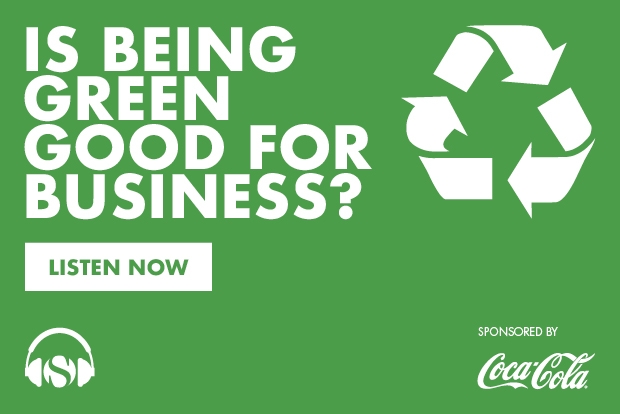On Monday 11th September, The Spectator hosted a round table discussion over lunch about whether being green is good for business. Guests included: Philosopher Sir Roger Scruton, Shaun Spiers, CEO of Green Alliance, Mark Saxon from Coca-Cola Great Britain, journalist Harry Mount, Tom Robinson, founder of Adaptavate, Bill Wiggin MP, Peter Aldous MP, Neil Parish MP, Scott Mann MP and Anthony Marlowe of Edelman. Fraser Nelson chaired the discussion. A podcast was recorded on the same day, which can be played above.
Recent bedtime reading for Sir Roger Scruton was a 50-page treatise by an art historian on the design of the classic Coke bottle, whose twists, it transpires, were designed specifically to foil counterfeiters. Less iconic, though no less important in some respects, is its modern plastic equivalent. Quietly, Coca-Cola bottles have become a model for what is known as the ‘circular economy’ – in which resources can be used and re-used, minimising waste.
It is hard to like plastic. It has become a symbol of the throwaway society, of carelessness with resources and maltreatment of the environment. It decays so slowly that the plastic bottles and containers in our landfill sites will still be recognisable if dug up in centuries to come. Worse are the islands of discarded plastic circling our oceans which, says Shaun Spiers of Green Alliance, campaigners have ironically lobbied the UN to recognise as a nation – in order to draw attention to their size. Sir Roger Scruton points out that some of the rules which have forced excess packaging on us have been inspired by large businesses wanting to gain commercial advantage over smaller competitors – it is easy for a supermarket to wrap goods in plastic, less so for a market trader.
Yet plastic bottles do not need to be a problem. It is perfectly possible to collect them and reuse them. Since 2012, the standard Coca-Cola bottle has been 100 per cent recyclable. Moreover, increasing numbers of the bottles are being collected and recycled by the company itself. Coca Cola has invested in a plastics reprocessing plant in Lincolnshire which has so far processed 2 billion bottles. Not all of the plastic in the company’s bottles is derived from fossil fuel – up to 30 per cent of the plastic used in some bottles is now derived from plant sources. Meanwhile, the amount of plastic used in the manufacture of a standard plastic bottle has halved over the past 20 years.
Just because plastic bottles are capable of being of recycled doesn’t mean that in practice they are. Only 57 per cent of bottles in Britain are currently recycled. Nationally, recycling has stalled, as householders struggle with over-complicated recycling collections and buyers of plastic become more discerning about what they will buy. In 2015, 44 per cent of domestic waste was recycled, 36 per cent incinerated to produce fuel and 20 per cent sent to landfill. That is far better than in 2000, when only 14 per cent was recycled and 77 per cent went to landfill, but since 2010 it is incineration rather than recycling that has been growing its share.
Automated sorting of waste can increase recycling rates – in Peter Aldous’ Waveney constituency the recycling rate has increased to 53 per cent thanks to a waste recycling transfer station. Is it too much to hope that in future almost all plastic waste could be eliminated – that the amount of it we use could be drastically reduced and what we do use could be continually recycled? There would be huge public support if it could, suggests Scott Mann, Conservative MP for North Cornwall. ‘One of the big differences between canvassing in the 2015 and 2017 elections was that voters liked David Cameron’s focus on the environment. I lost some of my green vote this year.’
Harry Mount, editor of the Oldie, points out that plastic waste has recently become a popular cause of the tabloids. The obligatory 5 pence charge which retailers must now levy on single use plastic bags, which commentators might once have opposed, has been a huge and popular success. The number of bags issued by retailers has plunged by 83 per cent since the charge was introduced in 2015.
Could something similar work for plastic bottles? The Scottish government is consulting on a deposit return scheme which could reinvent an idea that disappeared in the 1970s. ‘When you found an Irn Bru bottle you had an incentive to pick it up because you knew it was worth a few pence,’ says Fraser Nelson, editor of the Spectator. These days it happens in Sweden, one of the 20 countries around the world which does have such a scheme. But a well-designed scheme has to cope with the threat of fraud – otherwise you could end up with gangs importing lorry-loads of stolen bottles in order to cash in on the deposit.
Sweden is a model says Mark Saxon, head of public affairs for Coca-Cola in the UK. A well-designed deposit scheme works with a barcode, in order to combat fraud, says Saxon. ‘You put the bottle in a reverse-vending machine which reads the barcode and out pops your ten pence,’ he says. To be effective and to counter fraud, any scheme proposed by the Scottish government would need to be nationwide and to work with consumers. This way you wouldn’t need different barcodes for bottles sold in Scotland than those sold in England, which would be necessary to prevent cross border fraud.
The beauty of a deposit scheme, says Bill Wiggin, Conservative MP for North Herefordshire, is that it works on incentives rather than punishment. We have all heard stories of people fined for putting the wrong item in the wrong recycling bin. ‘Public behaviour will change as soon as plastic bottles are given a value,’ he says.
Recycling isn’t a panacea for all environmental problems, says Neil Parish, MP for Tiverton and Honiton. Once you take into account the amount of energy, detergents and carbon emissions used in recycling it is not always the best option. Some studies have suggested that in the case of some goods, incinerating them in order to generate electricity could be better. Yet there is widespread recognition that we cannot go on the way we have been – manufacturing packaging with little regard to where it will end up. The original – glass – Coke bottle was a cultural icon. Future products will be judged more according to how they impact the environment.






Comments